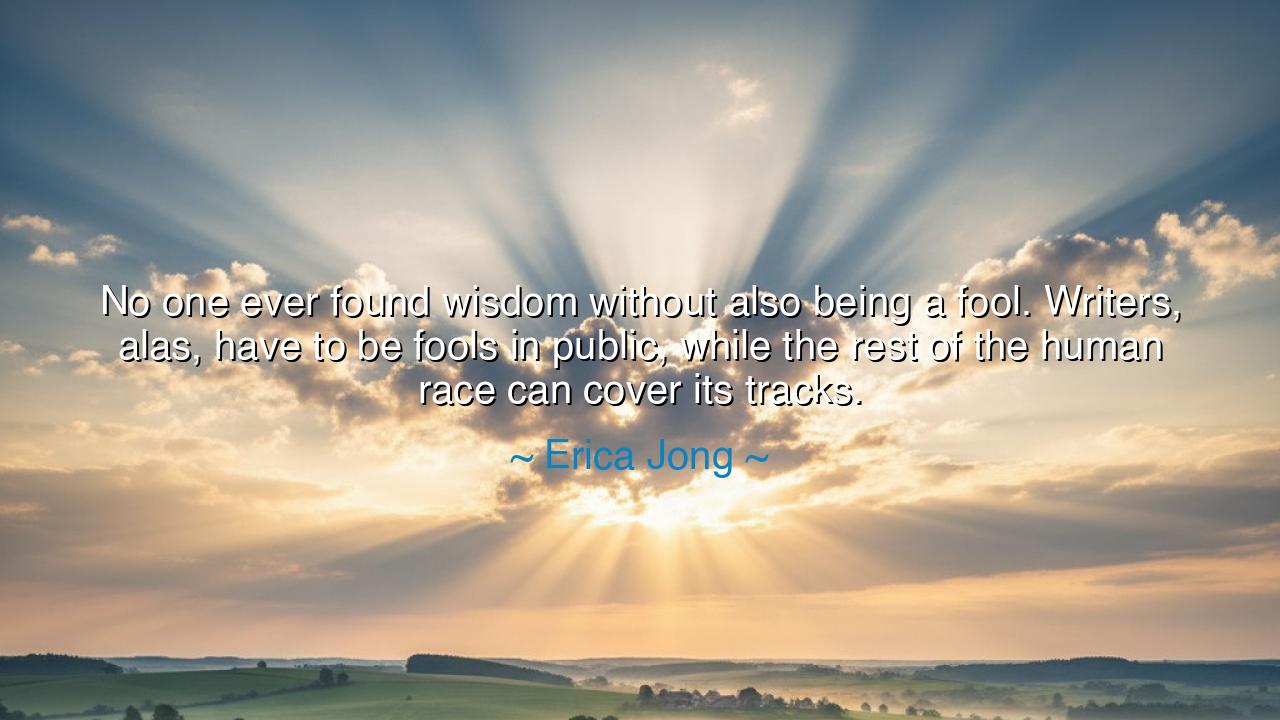
No one ever found wisdom without also being a fool. Writers
No one ever found wisdom without also being a fool. Writers, alas, have to be fools in public, while the rest of the human race can cover its tracks.






The poet and fearless voice Erica Jong proclaimed with piercing honesty: “No one ever found wisdom without also being a fool. Writers, alas, have to be fools in public, while the rest of the human race can cover its tracks.” In these words she unveils a hard but liberating truth—that the path to wisdom is strewn with errors, missteps, and follies. No soul ascends to truth without first stumbling in ignorance. Yet while most may hide their foolishness, the writer must bleed in the open, for their search is carved into words for the world to see.
The origin of this thought lies in the nature of creation itself. To write, to sing, to create, is to risk exposure. The artist dares to reveal their confusions, passions, and mistakes, while others cloak theirs in silence. The writer becomes a mirror, showing not only the triumphs of the human spirit but also its humiliations. Thus, to embrace the calling of art is to accept the role of the fool—not in stupidity, but in courage, daring to be vulnerable before the eyes of strangers.
History offers the example of Socrates, who in Athens was mocked as the gadfly, accused of corrupting the youth, and condemned as a fool. Yet it was through his relentless questioning, his willingness to seem ignorant, that he uncovered the deepest wisdom. Unlike others who hid their uncertainty, Socrates displayed his folly in the marketplace, where all could witness it. His legacy proves Jong’s truth: to find wisdom, one must dare to appear foolish.
The ancients often crowned the fool as a vessel of hidden truth. In Shakespeare’s plays, the jester speaks with sharper insight than kings. In medieval courts, only the fool could mock the monarch without losing his head. Why? Because folly and wisdom are twins, and only those willing to stumble openly can discover the deeper path. The writer, like the fool, bears this burden for all humanity, making visible what others fear to confess.
Therefore, O seekers, remember this: do not be ashamed of your foolishness, for it is the seed of wisdom. Better to stumble openly in pursuit of truth than to hide behind masks of false perfection. The writer may suffer the laughter of the crowd, but their folly becomes the world’s inheritance of truth. Walk bravely, then, into error and into learning, for only those who dare to be fools will ever grow wise.






MTMinh Trang
I think this quote points to a universal truth about creativity: we all have to take risks and be willing to fail publicly to truly grow. For writers, the stakes seem higher because their failures are always out in the open. But, is there a deeper, more philosophical question here — does true wisdom always require public exposure, or can it develop quietly, away from the spotlight?
PTBINH PHUONG TA
This makes me think about the concept of failure in creativity. Writers, as Jong says, have to be publicly foolish, but does that mean they are also publicly successful when they find wisdom? It seems that failure is almost necessary for growth, but do writers ever truly 'outgrow' the fool stage? Can someone be a 'wise' writer without exposing themselves to ridicule first?
LNLien Nguyen
This idea of writers having to be 'fools in public' is so intriguing. It makes me think about the courage it takes to expose raw thoughts to the world. But does this expose the writer to undue criticism? How does one maintain confidence while knowing that their mistakes, doubts, and vulnerabilities are all on display? There’s bravery in writing, but is it worth the price of public vulnerability?
TNTan Tri Ngo
I love the bluntness of this statement. It speaks to the messy process of creativity — that wisdom isn’t clean or polished but comes through trial, error, and sometimes embarrassment. But I wonder, is there ever a point where the 'fool' phase is too much, and it becomes hard to differentiate between wisdom and just chaotic thinking? How do writers know when they’re truly learning or just wandering aimlessly?
KHKha Han
This quote really resonates with me because it highlights the vulnerability that comes with creativity. Writers are forced to expose their flaws and uncertainties in a way that most people don’t have to. But I also wonder, does being a 'fool in public' mean sacrificing personal privacy for the sake of art? How does a writer balance the need for authenticity with the desire to maintain some personal space?